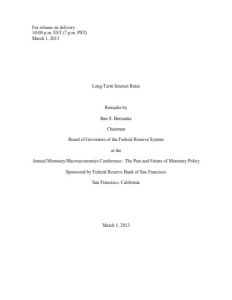Join getAbstract to access the summary!

Join getAbstract to access the summary!
Ben S. Bernanke
Long-Term Interest Rates
Remarks by Ben S. Bernanke, Chairman Board of Governors of the Federal Reserve System
Federal Reserve Board, 2013
What's inside?
Raising long-term interest rates too soon risks damaging the recovery and could lead to an even longer period of low rates.
Recommendation
In this key speech, Ben Bernanke, chairman of the Federal Reserve, summarizes the reasoning behind current policy on long-term interest rates, clarifying why a roll back now poses risks to growth and financial stability. Readers seeking a definite due date on the end of Fed easing and the arrival of higher interest rates may be disappointed. Nevertheless, getAbstract recommends his speech to all financial services professionals and investors seeking an increased understanding of the Fed’s current and future rates policy.
Summary
About the Author
Ben S. Bernanke is an economist and the chairman of the US Federal Reserve.


















Comment on this summary